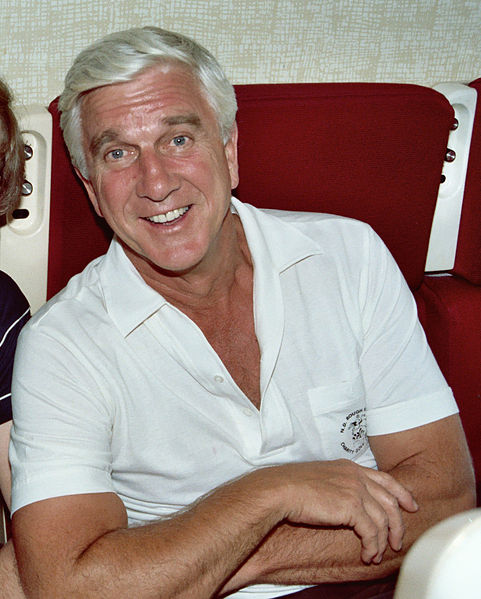There is a golden rule in cinematic comedy, wherein the characters can never be in on the joke. Of course, there are those who have subverted this rule, yet to produce top notch cinematic comedy it is something you can bend but seemingly never break. It’s a big reason why the likes of, say, the Grown Ups franchise feels flat; the characters are in on too many of their own jokes, a great deal of which involve passing gas (I’ve seen Uncut Gems, Adam Sandler, and I know you’re better than this dammit!).
It is an aspect of comedy that is very easy to overlook given how much we take it for granted today, but perhaps no film better exemplifies it than Airplane!, and no actor is more emblematic of it than its standout star, the late Leslie Nielsen.
There was a story I read many years ago, one that said part of what made Leslie Nielsen’s brand of comedy so infectiously brilliant is that he lacked a sense of humour himself and did not get the jokes, leading to his now trademark deadpan style. I tried researching this and found nothing to support it, but even then, it is difficult to accept that a man of such comedy royalty could not see the humour in his work, not mention the characters he played!
His monologue for SNL in 1989 surely supports this, as he affably laughs at the way in which he says “unfunny things, in an unfunny way”, before offering an example where he repeats the same line twice in the exact same way, although he claims the first is his dramatic delivery, while the second was comedic, the latter eliciting laughs while Nielsen delights at his own point had been proven. Prior to that, Nieslen even admitted that had he been told ten years earlier that he would eventually host a comedy show like SNL, he never would have believed it. This is not just some throwaway line by the writers, but a very honest statement that, along with his career prior to the 1980s, explains the origins of his distinctive brand of comedy.
What surprises many, including myself at one time, is that up until 1980, Nielsen already had a long and successful career as a dramatic actor in numerous films and TV shows dating back to 1950, with his most notable roles being in 1956’s Forbidden Planet (in which the actor is shockingly young and lacking his iconic snow-white hair) and 1972’s The Poseidon Adventure, both of which were nominated for Academy Awards and earned Nielsen consistent work and respect as a dramatic actor.
And then came Airplane! in 1980, forever changing the course of his career, and indeed his legacy.
Nielsen had be looking for a way to break into comedy acting, and the writers and directors of Airplane!, Jim Abrahams and Jerry and David Zucker, saw the potential in casting the actor, as they reportedly felt he was actually inherently funnier than most other comedy actors at the time, only others had failed to see it. In fact, the filmmakers had intentionally cast the likes of Lloyd Bridges and Peter Stack, who were two more actors with strictly dramatic backgrounds, and herein lies the genius of Abrahams and the brothers Zucker, as they wanted serious actors to deliver lines in a serious manner despite the absolute absurd scenarios in which they find themselves. Never before had a group of actors been so gloriously out of the comedic loop, and it was Nielsen at the forefront.
The actor embraced his newfound position as onscreen comedy royalty, starring in the likes of Police Squad! (a TV show created by the trio Airplane! filmmakers), which spun off into a film franchise of its own, The Naked Gun. With Airplane!, spoof comedy had taken its modern form and influenced countless imitations down the line, including the Scary Movie franchise, in which Nielsen even starred, reuniting with David Zucker on Scary Movie 3 and 4.
Leslie Nielsen never had to look back once he transitioned to comedy, an unequivocal move he likely had not anticipated at such a late stage of his career, yet it is also what consequently cemented Nielsen’s legacy as an icon of deadpan comedy, and the world of cinema is eternally indebted to his contributions.

